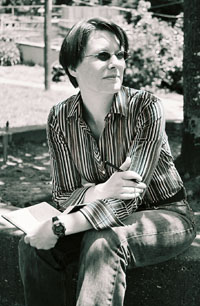 Mary Gray, the queer author of Out in the Country: Youth, Media, and Queer Visibility in Rural America and In Your Face: Stories from the Lives of Queer Youth,sat down for an Autostraddle interview about the lives of rural LGBT teens. Out in The Country shatters some stereotypes about life in a small town and reinforces others. I first discovered Gray’s work in a gender studies class and was excited to meet her when she visited Tulane University. In person Gray is warm, engaging, and incredibly intelligent— and um, really attractive! During our interview Gray discussed rural realities, queer identity claim making, violence, and the girls she couldn’t put in the book. In addition to research and writing, Mary Gray is an Assistant Professor in the Department of Communication and Culture at Indiana University, Bloomington. You can buy Out in the Country HERE
Mary Gray, the queer author of Out in the Country: Youth, Media, and Queer Visibility in Rural America and In Your Face: Stories from the Lives of Queer Youth,sat down for an Autostraddle interview about the lives of rural LGBT teens. Out in The Country shatters some stereotypes about life in a small town and reinforces others. I first discovered Gray’s work in a gender studies class and was excited to meet her when she visited Tulane University. In person Gray is warm, engaging, and incredibly intelligent— and um, really attractive! During our interview Gray discussed rural realities, queer identity claim making, violence, and the girls she couldn’t put in the book. In addition to research and writing, Mary Gray is an Assistant Professor in the Department of Communication and Culture at Indiana University, Bloomington. You can buy Out in the Country HERE
Chloe: Tell me how and why you conceived the idea of Out in the Country?
Mary Gray: I grew up in a small town and I was really curious by the time I grew what it would be like to stay put. I didn’t like it, I didn’t hate it, but I definitely got a sense that if I wanted my life to look different than what was around me I’d have to leave and go to school. I wanted to imagine what politics could happen in a hometown like mine.
What was the age range and socioeconomic status of the people you interviewed for Out in The Country?
I focused on folks who were 14 to 24. I wanted to mostly focus on people who were under 18 and didn’t have the means to leave. Most of the people I worked with were working class, working poor, either on social security insurance or they have service jobs.
How would you say the experience of female sex LGBT youth differed from male sex LGBT youth?
The young men who were gay identifying had a little more room to be fairly open about their identities. Several of them commented that it was something they had always been told they were, so it was no surprise to anyone when they came out. The men were always “the gay kid,” but I didn’t meet any women who said “I was always the lesbian.” I would argue a lot of that is because in terms of representative and visibility a lot of the representations we have are of gay, white men, which isn’t true for women. We really don’t have a consistent representation of what kind of room one makes for a lesbian or bi identifying women in popular culture. The biggest difference is that there’s an accessible public identity that was always pinned on young men but wasn’t available for young women.
Does that seem like a negative or positive to you?
Both. I think women weren’t constantly pressured to make claims about their identity. While the young men would often comment about being the one gay kid, they were also consistently harassed from a very young age. That wasn’t the case with women. People didn’t assume they were gay for being a tomboy or athletic. So women certainly talked about being able to fly under the radar. At the same time, most women in their communities the step after high school was getting married and they didn’t want that either. I don’t think they had the room to say, as part of their identity, this was or was not about being a specific guy. Particularly for women who really wanted to be with other women I think they felt conflicted about the lack of ability of settling down.
How did the community reaction differ for women?
Because women were not assumed to be hiding something nor did they have the pressure to come out, I think that affected how they were harassed. The young women who were the most gender nonconforming were the ones who got harassed the most. If there was the level physical violence that men discussed, they weren’t willing to talk about it. It’s tough to know what kind of violence happens to young women, who constantly have to prove something about their gender through their sexuality. Being physically available to men was a way of coping. I definitely know that some young women felt remaining sexually available to young men was a way of keeping the peace. That’s pretty violent. It’s tough to say in terms of harassment because young men talked about more stories of physical abuse but I think young women experienced a different kind of abuse.
That’s a good point because I think media representations of gay women and men are so different. Girls are ok as long as ultimately they’re performing for men, and that’s equally toxic.
Absolutely, I totally agree… And I think that’s precisely why there was some room given to homoeroticism between women, but only up to a point. The mentality is as long as it’s contained and has nothing to do with a relationship, we’re good here. I think that’s one of the places women struggled the most was, “how do I lay claim to specific identities and be part of a broader queer nation of women if I’m expected to act like a lady, marry, and be a mother”? I think things will really shift in the next decade or so because people won’t find it contradictory to be a queer women and a mom. It’s really rocking people’s world right now that it’s an option.
What factors do you think influenced the level of visibility?
I think the things that limited someone’s visibility were precisely the things that enabled it. The expectation that they’re going to be visible, out, loud, and proud was a testament to them. There was a group of guys who had a car with a rainbow sticker on it. Whenever they went through a specific county, they would peel off the rainbow sticker. I asked, ”Don’t you feel like your closeting yourself, doesn’t that feel demeaning that you can’t have your rainbow sticker on all the time?” One of them responded “I’m not less gay when I take the rainbow sticker off my car. I just know that if I have that in my car, I’m going to piss off people who are already angry at me.”
How did religion play LGBT experiences?
Many were ambivalent towards organized religion, but still felt a deep spirituality. Not too many of them seemed to be too broken up about not being in their church because I don’t think they necessarily associated their church with their sense of spirituality or religion… For the parents, I was surprised by how many of them turned to faith as a source of support for their children. One of my favorite families included a young person transitioning from female to male, whose mom was amazingly supportive woman. When I asked, “Where did your support for your child come from?” she replied, “You know, I’m a very religious person. God doesn’t make trash. So my child is not trash.”
What stereotypes or preconceptions about LGBT life in rural areas did you find most inaccurate?
The idea that everyone is going to be a hater. More often than not I found folks were either neutral or positive, and just didn’t have the forum to say they were absolutely fine with LGBT identifying people.
What negative stereotypes or preconceptions about LGBT life in rural areas were true?
Substance abuse. One of the things I didn’t write about in the book that I wish I had more courage to write about was recognizing how much of a problem methamphetamines and prescription pill abuse were, particularly in this age group. There are definitely folks getting no support that would give them the option of feeling hopeful. So that was pretty hard.
You said there were 7 girls that withdrew from the book. Is there anything in particular about their experiences that wish you could have written about?
If there was one thing I wish I would have been able to say, it was that young women in rural places carry a lot of weight and responsibility on their shoulders. I think they really have needs and in particular advocacy that we are woefully unable to provide, and I think sex and sexuality was a way for them to feel powerful and in control.
For more about Mary Gray visit her blog.


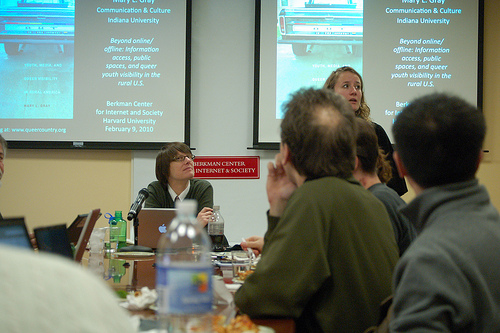
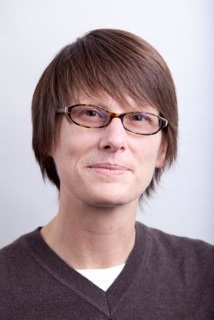
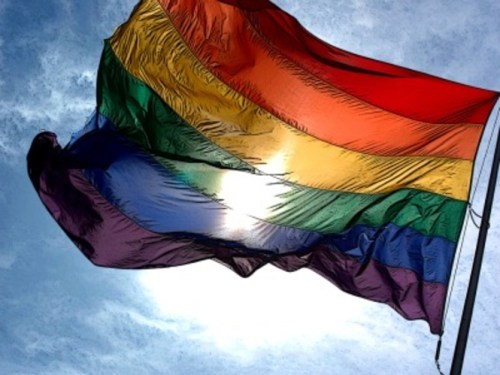
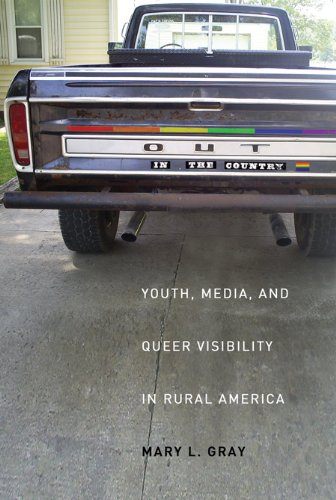

Going to buy this!
Fun side note about Sebastian: I hope to some day get involved with an organization that does education, outreach, advocacy, and support for LGBTQI youth in Appalachia.
Please.
Whoops, didn’t mean for that to sound sarcastic. I meant, that as far as I am aware there is not an organization for LGBTQIA outreach in Appalachia, and we desperately need one.
AG and Sebastian, you guys might be interested in GLSEN of middle TN and/or the Tennessee Equality Project.
Oops, forgot to mention that both have websites and Facebook pages – check them out!
http://chapters.glsen.org/cgi-bin/iowa/mtenn/about.html
http://www.tnep.org/
This is a fantastic interview, thanks! I think recognizing the lives of queer people in rural spaces is very important because so often queer is thought of as a big city thing, but it’s not. First of all, some people just don’t have the ability to get out- and some people don’t want to. I hate running into people who say “oh, if you’re gay you just shouldn’t be in ____ (rural place)” because it totally ignores economic issues and other things that prevent people from leaving, and besides, if no lgbt people ever stay in those places, nothing will ever change.
So props to the brave people doing their thing in rural spaces, by choice or not.
This part of the interview made me so sad though- “Being physically available to men was a way of coping. I definitely know that some young women felt remaining sexually available to young men was a way of keeping the peace.” I can’t even express… :(
Yes, that’s just tragic. It’s way past time women stopped feeling like they can only buy peace and social acceptance with their bodies. Even more tragic that this assessment is accurate in far too many places in the world.
Sounds like a fascinating book, though. Thank you for this great interview.
Agreed–some people don’t WANT to live in a big city. It’s kind of like the Canada thing–I don’t want to have to go somewhere else to have rights, because I deserve to have rights right where I am.
If I could change one thing, it’d just be more role models. I know in my hometown in rural Colorado, homosexuality was practically invisible. It would have helped my development as a person a LOT of I’d had other queer ladies to look at. It took me forever to come out even to myself, because first I had to figure out that girls were even an option.
THIS
Yes, exactly!
Yes!!!
That’s what rubbed me the wrong way about how the “It Gets Better” Campaign was run. Just graduate and then move to 1 of 10 cities. Some people can’t. Some people include their hometown and rural lifestyle in their identity. The only legit point Dan Savage brought up in regard to his “escape your small town” one-size-fits-all advocacy is that there’s less of us queer people, so we have to sort of congregate in a few areas to allow us to have a dating pool and a community, but I think that could be improved with the internet.
“This part of the interview made me so sad though- “Being physically available to men was a way of coping. I definitely know that some young women felt remaining sexually available to young men was a way of keeping the peace.” I can’t even express…”
What makes me even more sad is that men don’t think there’s anything wrong with this.
*Some* men, definitely. But I know men who would be utterly appalled at the thought.
I know, you are correct about that. But the number of ones that don’t think it’s a problem is pretty huge and sad.
And let’s be blunt, women need to stop doing that. In some situations (like living in Afghanistan, living in generational abject poverty, etc), they do what they have to, but if it’s possible to deal with things in another way, they need to stop doing that stuff in order to have any kind of fulfilling life.
“I know, you are correct about that. But the number of ones that don’t think it’s a problem is pretty huge and sad.”
Tragically true. Opportunism is not restricted to business.
“And let’s be blunt, women need to stop doing that. In some situations (like living in Afghanistan, living in generational abject poverty, etc), they do what they have to, but if it’s possible to deal with things in another way, they need to stop doing that stuff in order to have any kind of fulfilling life.”
Also true. But it can be incredibly hard to get past early conditioning, especially when trying to do so will put you at odds with your entire family and community. I suspect that just as some LGBTQIA people will continue to be closeted until there is zero social or political penalty for being queer, so too not all women will feel able to look out for themselves properly until it is acceptable, ‘normal,’ even *expected* for women to be active and decisive agents in their own lives.
“Also true. But it can be incredibly hard to get past early conditioning, especially when trying to do so will put you at odds with your entire family and community. I suspect that just as some LGBTQIA people will continue to be closeted until there is zero social or political penalty for being queer, so too not all women will feel able to look out for themselves properly until it is acceptable, ‘normal,’ even *expected* for women to be active and decisive agents in their own lives.”
You are also correct about this, but I think things will only change when women stop doing this. Men have no impetus to change, so they mostly won’t. Everybody has a part in it, but I would rather look at how I can change, rather than waiting for other people to come to their senses.
Definitely. The more women who choose to take control of their own destinies, the easier it will be for others to do so, as it will be more socially ‘normal.’ It’s much easier now than it was 50 years ago.
We need to ensure that women have a safe place / community to go to in case things go badly wrong, though. It can be hard to do even when you know there’s a safety net, let alone when you think you are truly on your own.
“This part of the interview made me so sad though- “Being physically available to men was a way of coping. I definitely know that some young women felt remaining sexually available to young men was a way of keeping the peace.” I can’t even express…
Newbie chiming in here. This. This mentality royally screwed me. I was so conditioned to feel this way that I didn’t even realize my sexual orientation. I got married young and had kids, because I knew from the time I was small enough to understand that this is what was expected of me and was suckered into believing that my happiness depended on it. Of course, in hindsight I see that all the signs of my orientation were there, but anything authentic about myself was suffocated and made unrecognizable by the immense pressure I felt to be available to men.
Why do you think made you change?
Sorry, that’s What do you think made you change.
Extreme hardship. I grew up in a pretty f***ed environment, obviously, so the minute things started going bad in my life with my marriage (which was a disaster waiting to happen from the beginning) everyone abandoned me. I had to do a lot of reflecting then and started really searching for why I always felt out of place. I strayed from the oppressive religious ideals I had blindly adopted as a part of that brainwashing, which was really hard and unbelievably scary for me, but that was the first turning point. I became more independent and started standing up to my family, things started to become more clear, but still there was something I couldn’t place my finger on. Then I met an amazing woman and the light bulb went off. I kept my distance because I wanted to be sure that I wasn’t just reacting to the hardships I had recently endured, but the more time I took to reflect on my life, the more it all started to make sense to me. Now that I know, I finally feel authentic; I never did before. The situation isn’t ideal obviously, it’s turned my world upside down. But once I became aware, I had to start moving forward. No going back.
I respect what you say. Glad you got through it and had the ovaries to change. I think change like the one you made is the kind that will change things in the big picture.
This is great! I think I’ll buy it too.
thanks for this. really.
Her book has been on my reading list for months! Now I really want to read it. I like that she addresses the impact of class and gender on queer-ness, and that she shows how people can be religious and *not* virulent homophobes.
Great interview, thanks!
this was really very good. i think i’m adding this to the list.
“You know, I’m a very religious person. God doesn’t make trash. So my child is not trash.”
This. So. Much.
I want to put it on a sign to carry around with me.
So with you on this one.
Me too! That story was maybe my favorite part of the interview and book. Actually I think I may have teared up a little while reading it.
I read that initially as ‘Macy Gray Knows What it Feels Like For Gay Kids in Rural America’ and was like “ZOMG! MACY GRAY FINALLY CAME OUT!!!”… and then I realized it wasn’t, was briefly disappointed and now I’m listening to Macy Gray songs. I need some sleep.
aaaahahaha i made that same mistake…. sleep sounds good
I read it as “Mary Kay” at first and I was totally confounded, so…Yeah. It happens lol.
I read the way it was written, am not tired, but am now listening to Macy Gray. The rasp gets me.
This is wonderful. Thank you Chloe. Will definitely get the book.
awesome interview, thanks!
This is a wonderful topic that I’m interested in but I had to stop reading the interview because there were too many grammatical and punctuation errors.
I know Autostraddle isn’t hung up on those things and that many articles on the site are written casually, but those usually seem intentional. This one does not. Maybe it’s just residual nit picking from being a PR major in college where we’d get a point taken off our score for every AP error. I’m sure this comment would have several points deducted if that were still true, and I’m sorry to be a jerk, but proofreading is important.
Shockingly enough I don’t think people speak with correct grammar most of the time. I’ve given interviews before and you’re supposed to report what was said, not the improved version of what was said.
Sure, but things like missing/incorrect words and punctuation are not inherent in the interview itself. You don’t necessarily say apostrophes, they’re just supposed to be there or not.
When you love something you want it to be the best it can be. I want Autostraddle to be the best it can be. It’s not helping the writer or the interviewee to have something rife with obvious typing (not transcription) errors out there for public consumption.
I’m not expecting anyone to agree with me, but I think I have a have a valid point.
Um, I <3 you. I would never have probably said anything, so props. But the typos/grammar errors were glaring to me, too.
And, really, this topic is pretty much my youth story, but 20 years ago. So it hits home. I agree that loving something means I want it to be the best.
I’ll back you up on this because I’m a fan of OTHER people having proper grammar. And because you’re my AS friend and that’s what AS friends do. They stick up for each other.
I still think you and this article are the cats pajamas, Chloe.
Honestly, I’m a grammar/spelling nazi just about all the time. Punctuation errors make me wince. *But* I’ve had to learn that if I’m going to let it get to me that badly, I’ll miss reading interesting articles and valid points of view that might help me think outside my own box. So while I still wince when I see misspelled menus and magazine articles etc. (because, really, when people are trying to sell a product they really ought to make an effort!) I’ve learned to suspend my editing reflex online. I’ve come to realise that the *heart* of what a person has to say is far more important than how they express it. Also, I’ve noticed that it’s harder to spot my own errors on the screen than in hard copy, and I assume that may be the case for others also.
As a side issue (and I’m not saying anyone on AS does this), I’ve noticed that a common tactic for putting someone down on the internet is to criticise their spelling/grammar and thereby call into question their intelligence without ever actually addressing the point they have made that the attacker disagrees with. Usually, this seems to happen simply because the attacker has run out of argument. I do not want to ever be that person.:P This tactic also ignores the fact that education is a privilege, that people may be dyslexic etc, and that education does not equate with intelligence. I know a lot of really dumb intellectuals, and some really smart but under-educated people.
Yes! Well said :)
Ok but if there’s a word missing its probably because Gray didn’t say it and if a word is incorrect it’s because Gray did say it. From what I learned in journalism class you can’t add or change words of someone you are interviewing. When I read the article I took the grammar as an attempt to mimic the pace/way Gray talked, which I think is perfectly fine. Eh I don’t really want to get in some silly comment dispute but focusing on grammatical correctness strikes me as petty and totally missing the bigger picture. It comes down to content. I’d rather read one insightful interview than 20 grammatically correct pr blasts. Its a shame you stopped reading the article because Gray made some points far more important than comma placement. To me anyway.
And now I wish I’d read further before leaving my comment above, as it’s redundant… ;)
I do not want to live in a city. Have done so before. Not for me.
Yes but you’re diver. You’re like the Chuck Norris of lesbians.
This.
Does this mean that Chuck Norris facts are also true of diver? http://www.chucknorrisfacts.com/chuck-norris-top-50-facts
“some magicians can walk on water, diver can swim through land”
When diver goes swimming she grows gills to avoid the pesky task of coming up for air.
She can go diving without ever having to come up for oxygen? Some people wonder what the next step in lesbian evolution is. Other people wonder how many years it’s gonna take for us to be like diver.
All this because I did not want to pay $1,000/month in NYC to live in an apartment the size of Anne Frank’s hideout and where some guy had to walk through my bedroom to get to his. You freakin people.
Oh, false modesty. Bless your big queer heart.
Or pay $$$ to live with the meth addicted cook in SF. Although another guy in that house had a big collection of Edith Piaf records and porn, so I learned who Tom of Finland was and whacked off to that a lot.
Gillyweed.
There should be a tumblr for ethnographers who look like Justin Bieber. Just saying.
This book was fantastic. Reading for my Women’s and Gender studies Senior Seminar. We had a really good discussion about the problems with metronormativity relating to the many queer people who can’t or won’t move to the cities and who shouldn’t have to.
ALSO: For those who are thinking of reading it, but hesitate due to many queer research books being full of so much queer theory jargon that it might as well be in a different language (and I often posit that queer theory really is its own language due to every essay I write for my classes being covered in red squiggly lines on Word), YOU’RE IN LUCK!
Out in the Country is SUPER accessible. Another hiphooray for Gray!
Yes I agree good point! After a while I find queer theory jargon gets pretty tedious but Out In The Country was intellectual yet comprehensible and interesting.
oooh i want to read this but i can’t get my library to buy something by eileen myles, so i have little hope of getting my hands on this :/
Much like the pair of argyle socks with moustaches on them that I now own, I was not consciously looking for this book, but when I discovered it I realized that it was a marvelous, unsurpassable creation that my life would not be complete without.
I also feel like this book will help me eloquently express all my feelings about growing up in a small town, which usually just sound like, “Um, cows and shit. And homophobes.”